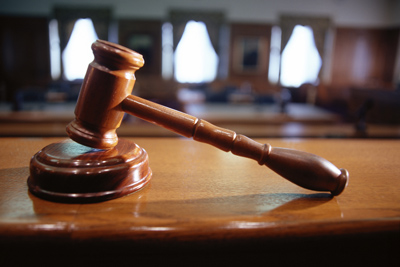
Film scholar Carol Clover has written that “trials are already movielike to begin with and movies are already trial-like to begin with.” November 14-15, Amherst College convenes “Trial Films on Trial,” a conference of film and law scholars discussing how movies shape and reflect our ideas about the law.
“Trial films are interesting because they have trials in them but they also have a trial logic to them,” said Professor Martha Umphrey (Department of Law, Jurisprudence and Social Thought), who is organizing the conference.
To understand what the conference is driving at, we asked Umphrey to list some of her favorite films featuring trials. Her verdicts follow, in her own words.
Twelve Angry Men (1957)
This is the most famous and obvious one, although there’s very little about the trial itself in that film. Henry Fonda takes over the role of the defense attorney and is able to raise enough reasonable doubt in that jury room to overcome an 11 to 1 initial vote. It’s quite remarkable.
You’ve got the ad man, the working class guy, the architect who's the sort of intellectual, and the bully … It’s meant to be a kind of microcosm of the democratic practice. De Tocqueville said the jury system should be regarded as a free school in the democratic process.
To Kill a Mockingbird (1962)
Partly derived from the classic novel, it captures a particular moment in American history and racial tensions around that moment, and the trial scene is a substantial part of the film. It shows the way law, and a kind of vision of law which is about the rule of law and equality, can be asserted in the face of obdurate racism. It's a very moving and powerful film.
Inherit the Wind (1960)
This is really a film about trials as public spectacle. It doesn't accurately track the actual facts of the case particularly well: it's all about showing the public watching a performance of a public debate about evolution and creationism. It shows the ways in which trial forums can be places to work through social dramas.
Witness for the Prosecution (1957)
This one is also about trials as spectacles. The courtroom is packed, and it’s about acting and artifice, and trying to get at the truth and then duping the system because you can be such a good actor. Charles Laughton is the amazing defense attorney who's come back after a heart attack and he's going to take the toughest possible case. There's a leitmotif about spotlights and about vision and monocles and acting, that is both entertaining and goes to show the ways in which trials are public events.
Judgement at Nuremberg (1961)
There is something really important about that postwar period, that period of liberal consensus where these films put law on trial. The law is seen as fragile or flawed, but capable of greatness. The question in this film is, can you hold the Nazi judges responsible for applying the laws as they were given to them? How do you put a regime on trial and make claims on behalf of civilization? Spencer Tracy basically says, you were guilty the minute you condemned one innocent man to death. It’s about the role of the judge in relation to justice.
A Few Good Men (1992)
This is really a film about lawyering. Tom Cruise is this wiseacre who thinks he's better than everybody else, who's assigned this case, and then turns into a phenomenal trial lawyer. He does it by understanding the psychology of questioning and by understanding the role of performance in lawyering. He bluffs his way into cracking the witness. For me this film is a bildungsroman about a lawyer who's able to assert the values of justice and process in the face of what looks like, by the end, a kind of fascist regime in Guantanomo.
Anatomy of a Murder (1959)
This is a brilliant film. Jimmy Stewart is the attorney who's kind of down and out, and it's a case about a guy who kills someone whom he thinks is his wife's lover. And that turns into a case about whether or not the defendant can fake a defense, an insanity plea. It's again about the ethics of lawyering and the ways in which lawyers coach defendants into telling particular stories in order to make a case turn in one direction or another.
My Cousin Vinny (1992)
It's funny, but it's a really good trial film. By the time you get to the 70s you tend to see more scepticism about the possibility of law doing justice. There’s more focus on corruption, and you get to something Dirty Harry, [who] has no patience for constitutional rights and the Miranda warning and all that … but then there are films that recuperate it like My Cousin Vinny, where a guy represents himself and he manages through the gift of his rhetoric to make things work out.
Capturing the Friedmans (2003) & The Thin Blue Line (1988)
One of the things that you start to notice when you teach these films is they are actually often structured like trials.
Capturing the Friedmans is a documentary about a Long Island case involving alleged child sexual abuse in the 1980s. What's interesting is that the film is built out of home movies that the family shot. It’s a classic example of a trial film. There's a trial in it —you see the courtroom setting and the judge and so forth— but it's really structured to be a trial, a kind of back and forth presenting evidence. Another example of that is The Thin Blue Line, where you have this kind of back and forth going on. You put the legal system on trial: here's some evidence, here's some opposing evidence, there’s line of argument playing forward.